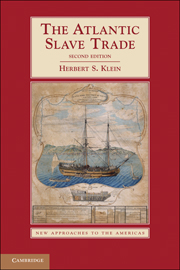Book contents
- Frontmatter
- Contents
- List of Maps, Figures, and Tables
- 1 Major slave-trading zones of western Africa
- 2 Major slave-trading ports of Senegambia and Sierra Leone
- 3 Major slaving ports of the Gold Coast and the Bights of Benin and Biafra
- 4 Major slaving ports of southwestern and southeastern Africa
- Introduction
- 1 Slavery in Western Development
- 2 American Labor Demand
- 3 Africa at the Time of the Atlantic Slave Trade
- 4 The European Organization of the Slave Trade
- 5 The African Organization of the Slave Trade
- 6 The Middle Passage
- 7 Social and Cultural Impact of the Slave Trade on America
- 8 The End of the Slave Trade
- Appendix
- Bibliographic Essay
- Index
6 - The Middle Passage
Published online by Cambridge University Press: 05 June 2012
- Frontmatter
- Contents
- List of Maps, Figures, and Tables
- 1 Major slave-trading zones of western Africa
- 2 Major slave-trading ports of Senegambia and Sierra Leone
- 3 Major slaving ports of the Gold Coast and the Bights of Benin and Biafra
- 4 Major slaving ports of southwestern and southeastern Africa
- Introduction
- 1 Slavery in Western Development
- 2 American Labor Demand
- 3 Africa at the Time of the Atlantic Slave Trade
- 4 The European Organization of the Slave Trade
- 5 The African Organization of the Slave Trade
- 6 The Middle Passage
- 7 Social and Cultural Impact of the Slave Trade on America
- 8 The End of the Slave Trade
- Appendix
- Bibliographic Essay
- Index
Summary
Having been purchased on the African coast, the slaves destined for America would cross the Atlantic in a journey that became known as the “Middle Passage.” The manner in which these slaves were carried and the mortality they suffered have been one of the most notorious issues in the study of the Atlantic slave trade. A popular literature has painted this part of the slave experience as uniquely evil and inherently more inhuman than any other of the horrors of the slave life. This has a great deal to do with the early abolitionists who found that this part of the African enslavement process was the most easily attacked. The merchants of the trade could be opposed with impunity, whereas the American slave-owning class could not be attacked as easily. A group of eighteenth- and early nineteenth-century British propagandists developed their portrayal of the trade out of the belief that the entire transportation experience was an unmitigated disaster. But even one of the most important of these early writers, Thomas Fowell Buxton, argued that only some 18 percent of the mortality suffered in the trade occurred aboard ship, and that almost 71 percent occurred in the transportation of the slave to the coast, and the rest was due to the adjustment to New World conditions after landing. To put the so-called Middle Passage in context, it should be recalled that the water crossing on average took a month from Africa to Brazil and two months from the West African coast to the Caribbean and North America.
- Type
- Chapter
- Information
- The Atlantic Slave Trade , pp. 132 - 161Publisher: Cambridge University PressPrint publication year: 2010

